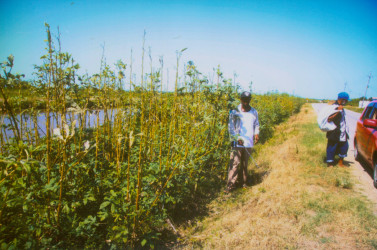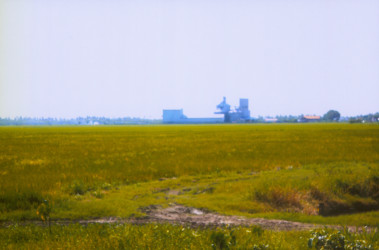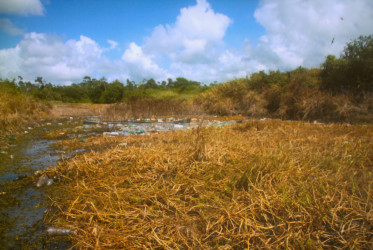You can cut the anxiety that has been generated in the Black Bush Polder area over the prevailing trials of the rice industry with a knife. More than 400 farmers in Johanna, Yakusari, Mibicuri and Lesbeholden cultivate around 17,000 acres of rice. Their concerns mirror those of their counterparts across the country’s rice-growing communities including the Essequibo coast, where this newspaper visited just two weeks ago.
Like in Essequibo, relations between farmers and millers are strained by friction over prices and by the long wait which the farmers must sometimes endure for payments.
Rambrich, a Bengal, Coren-tyne farmer who buys paddy from Black Bush farmers told Stabroek Business that he pays on time. We were unable to secure confirmation to that effect from any of the Black Bush farmers.

Late payments, Rambrich says, have to do with the fact that rice is being marketed at a snail’s pace. At the moment his silos are bloated with 1,200 tonnes of paddy. He still has some storage capacity but the risks of overstocking are considerable. It is, he says, the same with other millers.
Currently, according to Rambrich, rice sales from Guyana to Jamaica fetch US$370 per tonne compared with $US700 – 800 per tonne under the now near exhausted PetroCaribe agreement with Venezuela. The future of the sector, the Black Bush farmers say, is heavily dependent on finding new external markets and expanding traditional ones.
Landlordism has long been commonplace in the rice industry and as rice cultivation has become more profitable those farmers who rent fields have accused their landlords of gouging them. In the Black Bush Polder area leasing a 15-acre field can fetch up to $300,000. These days, Rambrich says, the farmers must pay their rents ‘up front.’
There are water problems too. Water to irrigate the rice fields of Black Bush Polder comes from the Canje Creek and accesses the fields via a conduit known as the ‘pumping trench canal.’ There is no reliable schedule for supplying water so that there is an almost continuous flow to the fields.
Overtopping from the one field to the next means that serious flooding sometimes occurs. Some rice farmers are suggesting that in order to create a simultaneous demand for water in the rice fields that sowing take place at the same time.
Flooding often wreaks havoc with the efforts of the Black Bush families to subsidize their incomes through cash crop farming. The cash crop farms are located close to the rice farmers’ homesteads. Tired of the flooding and the attendant destruction of their crops some of the families have moved their farms to higher ground…the state reserves. The Neighbourhood Democratic Council (NDC), it seems, has opted to overlook this indiscretion.


The NDC has also decided to support the farmers by providing what are known as ‘four hour jobs ….employing hymacs to build a series of large banks that allow for farming above the level of the floodwaters. There are claims that the NDC’s support is selective.
As for the wider problem of flooding in the Black Bush Polder area, the farmers say that the heavy silting of the waterways immediately beyond the kokers at Eversham and No. 43 mean that as far as removing water from the land is concerned the kokers serve only a limited purpose.
This newspaper secured a distinct sense that Black Bush farmers are charging official neglect on the part of government. Complaints to the NDC about difficulties that impede their livelihoods have not met with adequate responses. Visits to the area by high officials of government and the political opposition are, they contend, limited to periods of elections campaigning.
During the last rice crop the application of fertilizer by aircraft was introduced in Black Bush Polder by the Corentyne business Nand Persaud & Company Ltd. Whilst many of the farmers have bought into the service ordinary residents of the community whom, hitherto, comprised the vast army of helpers who used to apply fertilizer by spray guns and who were paid $32,000 to spray a 15-acre plots say that they are watching their jobs disappear. The farmers, meanwhile, embrace the new service on the grounds that it is more reliable.
The social problems in the community warrant urgent remedial attention too. South Mibicuri rice and cash crop farmer Marvin Duncan told Stabroek Business that farming families’ preoccupation with their immediate livelihood mean that in far too many instances young males leave school prematurely to work on cattle farms or to tend rice crops. He is concerned that once improved technology displaces labour in the cattle and rice industries many of Black Bush Polder’s undereducated young men could find themselves without worthwhile jobs. Those who find themselves inheriting rice or cattle enterprises could well discover that they lack the necessary training to manage successful businesses.
Duncan estimates that as many as half of the young people – below the age of 22 – are unemployed and, worse, idle. It manifests itself, he says, in instances of drug addiction, gambling, excessive alcohol consumption, theft and violent confrontations. It is not only the economy of Black Bush Polder that needs fixing.




